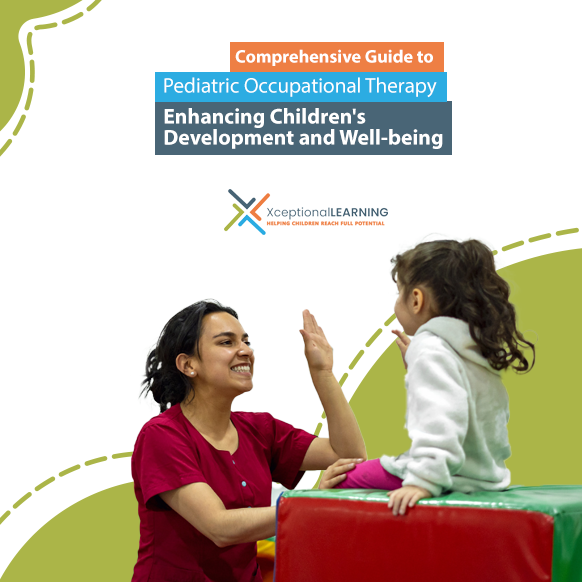Comprehensive Guide to Pediatric Occupational Therapy: Enhancing Children’s Development and Well-being
admin June 14th, 2024
– Clinically Reviewed by
Bachelor of Occupational Therapy
AIOTA Certified Occupational Therapist
Introduction:
Pediatric occupational therapy plays a crucial role in supporting children’s development and well-being by addressing challenges related to daily activities, motor skills, sensory processing, and more. In this blog, we’ll explore the fundamentals of pediatric occupational therapy, its benefits, and how you can access occupational therapy services through online platforms and find best occupational therapists near you.
Assessing Child Development:
Assessing child development is a multifaceted process in pediatric occupational therapy, encompassing comprehensive evaluations of motor skills, sensory processing, cognitive functioning, and social-emotional development. Occupational therapists utilize standardized assessments, observations, and parent/caregiver reports to gain a holistic understanding of each child’s strengths and challenges. These assessments serve as the foundation for creating personalized intervention plans tailored to the unique needs of the child. By identifying areas of concern and potential areas for growth, occupational therapists can guide families in fostering their child’s development and maximizing their potential to thrive in daily activities and interactions.
Setting Goals for Success:
Setting goals for success in pediatric occupational therapy is a collaborative process involving therapists, children, and their families. These goals are crafted to be specific, measurable, achievable, relevant, and time-bound (SMART), aiming to enhance the child’s independence and participation in daily activities. By aligning therapy objectives with the child’s unique needs and interests, families are empowered to actively contribute to their child’s progress and celebrate milestones along the journey toward success and increased quality of life.
Exploring Sensory Integration:
Exploring sensory integration in pediatric occupational therapy involves understanding how children process and respond to sensory stimuli. Occupational therapists employ various activities and techniques to help children regulate their sensory experiences, improving their ability to engage comfortably in daily tasks. By addressing sensory challenges, therapy promotes enhanced participation, self-regulation, and overall well-being in children.
Improving Fine Motor Skills:
Improving fine motor skills is a core focus of pediatric occupational therapy, targeting the development of precise movements involving the hands, fingers, and wrists. Through a variety of engaging activities such as finger painting, puzzles, and tweezers, occupational therapists help children refine their hand-eye coordination, dexterity, and grip strength. These skills are essential for writing, drawing, and self-care activities such as buttoning clothes and tying shoelaces. By nurturing fine motor skills, occupational therapy enables children to achieve greater independence and confidence in everyday tasks, laying a strong foundation for their overall development and success.
Enhancing Gross Motor Skills:
Enhancing gross motor skills is a pivotal aspect of pediatric occupational therapy, focusing on refining large muscle movements essential for running, jumping, and climbing. Occupational therapists employ diverse exercises and play-based activities to improve balance, coordination, strength, and mobility in children. From obstacle courses to ball games, these interventions promote physical development while fostering confidence and independence in navigating the world around them. Strengthening gross motor skills not only enhances a child’s ability to participate in sports and recreational activities but also facilitates success in academic settings and daily routines, laying the groundwork for a healthy and active lifestyle.
Utilizing Play-Based Therapy:
Utilizing play-based therapy is a cornerstone of pediatric occupational therapy, harnessing the innate power of play to foster growth and development in children. Occupational therapists employ a wide array of playful activities tailored to each child’s needs and interests, ranging from imaginative games to sensory exploration and constructive play. Through these engaging experiences, children learn valuable skills such as social interaction, problem-solving, and emotional regulation naturally and enjoyably. Play-based therapy not only facilitates skill acquisition but also promotes positive self-esteem, confidence, and resilience. By embracing the joy of play, occupational therapy creates a dynamic and supportive environment where children can thrive and reach their full potential.
Accessing Assistive Technology and Adaptive Equipment:
Accessing assistive technology and adaptive equipment is a pivotal aspect of pediatric occupational therapy, ensuring that children with physical or cognitive challenges have the tools they need to participate fully in daily activities. Occupational therapists collaborate with families to identify appropriate assistive devices, ranging from specialized utensils and communication aids to mobility aids and computer software. These tools are carefully selected to match each child’s unique needs and abilities, empowering them to overcome barriers and maximize their independence. By providing access to assistive technology and adaptive equipment, occupational therapy promotes inclusion, accessibility, and equal opportunities for children of all abilities to thrive and succeed in various aspects of life.
Conclusion:
In conclusion, pediatric occupational therapy is a transformative journey that empowers children to overcome challenges and reach their full potential in daily life. From enhancing fine motor skills to fostering sensory integration and promoting gross motor development, occupational therapists play a crucial role in supporting children’s growth and well-being. By utilizing play-based interventions, setting SMART goals, and accessing assistive technology, therapy becomes an engaging and effective process tailored to each child’s unique needs. Through collaborative efforts between therapists, children, and families, pediatric occupational therapy paves the way for increased independence, confidence, and success in all aspects of life. XceptionalLEARNING integrates occupational therapy principles into its educational platform, offering tailored features to support diverse learners. From personalized assessments to adaptive activities promoting fine motor skills, sensory integration, and cognitive development, our platform is designed for individualized growth. Contact us to learn more about how we can support your unique needs and goals.

